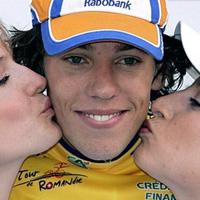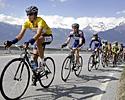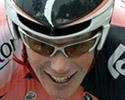
Recently on Cyclingnews.com |
62nd Tour de Romandie - ProT
Switzerland, April 29-May 4, 2008
Racing between the lakes
Mountainous course offers good Giro prep
By Bjorn Haake

|
The 62nd Tour de Romandie will take in 659 kilometres when it makes its way from Geneva to Lausanne between April 29 and May 4, once again serving as the final preparation for the Giro d'Italia, scheduled to start just one week after Romandie's conclusion. The parcours features a great mix of terrain, with a short, flat 1.9-kilometre prologue kicking off the Swiss race in Geneva.
The climbers will be tested right away, as the peloton rides over 182 kilometres from Morges to Saignelegier, taking in two category two climbs as well as the category one peak in Saulcy, the final climb of the day. The highest point of the stage is the first mountain and while not terribly steep, Le Bugnenets is 1117 metres high. The decisive moment will likely come after Saulcy, when the mountain points are already awarded, but a false flat, paired with the final sprint of the day, will show who can deliver. Once the riders have really reached the top, there is another dozen of kilometres to go before the finishing banner.
The second stage goes from Moutier to Fribourg, host of the prologue last year. The altitudes of the stage are roughly between 500 and 800 metres the whole day. While there is one category one, two and three climb each, it is not quite as hard as the day before and could see a small break get clear.

|
The fourth stage is a time trial from Sion to Sion, which starts out pancake flat for the first seven kilometres, before gradually lifting upwards and then steepening substantially at kilometre nine. Over the course of almost three kilometres, the riders will gain 200 metres in altitude and reach the top at the 728-metre high Croisele. After that, it is almost all downhill, except a little bump a good kilometre before the finish. The total distance will be 18.8 kilometres.
The day after the time trial will see the queen stage, over 127 kilometres from Sion to Zinal, probably one of the most spectacular stages in the history of the tour. However, the riders may not enjoy the start so much. Right when the neutralisation ends the flat road does too and the peloton will have to climb to Vex (1024m) – the worst being that it's not even a ranked climb. The mountain points are given 15 kilometres later, at the 1432-metre high Saint Martin. The category one climb is followed by a high-speed descent towards the first sprint of the day, in Réchy (km 48.6). If sprinters with climbing legs make it to that point, it is unlikely they can stay with the skinny riders over the 1332-metre high Vercorin. It is also a category one, again followed by a sprint once the bunch is back down in the valley.
From then on, the stage turns from bad to brutal, as the riders will climb over the third category one mountain of the day. Saint Luc stands at 1543 metres, and is only followed by a short descent, before the 1585-metre high Griemenz. It is the final mountain classification point of the day, but to get to the finish the riders will still have to go up to 1677 metres, to reach the comfort of the finish in Zinal. This incredibly hard stage will not only likely bring the decision in the overall, but may have some riders re-think their ambitions for the Giro d'Italia.
The final stage isn't exactly flat, but the biggest difficulty of the day, the 1445-metre high Col de Mosse, comes early in the 154-kilometre stage. After that, the climbing isn't too hard and the run-in to Lausanne is even downhill, so a dramatic finish like last year's time trial in Lausanne may not be on order this time around. When the riders see the waters of Lake Geneva again, they know they are home.
Will Dekker repeat?
Defending champion Thomas Dekker will be on the start line and has to be counted as one of the big favourites for the overall win again. Not only because last year he showed stamina during the penultimate, rainy mountain stage and the final time trial – where he took over the lead from US American Chris Horner (who will also return with the Astana team) – but also because the Dutchman has shown good from during the Ardennes Classics. If he can't deliver, Rabobank has the luxury of having a plan B, in the form of Russian Denis Menchov.

|
Horner will try to play his cards differently this time, and if he can be in the lead again going into the last day his chances of taking the overall victory are much better, as the time trial will already have concluded by then. It's no secret that Horner likes the medium mountains much better than the fight against the clock. Of course, if Andreas Klöden is feeling well, Horner may have to set his own ambitions aside, but the German has been suffering from sickness this year and his form now is uncertain.
What will be interesting to see is what Team CSC will do. They are sending a very strong line-up, with Kurt-Asle Arvesen, Fabian Cancellara, Volodimir Gustov, Alexandr Kolobnev, Gustav Erik Larsson, Carlos Sastre, Chris Anker Sørensen and Nicki Sørensen. Spain's Sastre will likely not be going all out, but testing the waters in preparation for the Tour de France. Switzerland's Cancellara will want to show that he can do tough time trials with climbing mixed in as well, while Larsson will be eager to forget about his mishap in the Flèche Wallonne, when he crashed only a few kilometres from the finish.
In the French speaking part of the country known for cheese and chocolate Française des Jeux's Sandy Casar may be extra motivated to take a stage victory. Who wouldn't remember his classy move in the Tour de France stage 18, not before taken out by a dog earlier in the stage.
Caisse d'Epargne will make good use of Oscar Pereiro and Vladimir Karpets, while Gerolsteiner has Bernhard Kohl for the hilly terrain. His team-mate Markus Fothen won stage one a year ago. With the mountains looming, expect John Gadret (AG2R La Mondiale) playing an active part in the race, but the time trial may not suit him enough to place ahead in the overall.
Lampre has two mountain goats with Matteo Bono and Sylvester Szmyd, while Liquigas holds hopes for the time trial, with Roman Kreuziger.
Robbie McEwen will also take to the start to use the climbing to get in shape for the Giro d'Italia. The spring has been winless for the Australian of Silence-Lotto, but his recent third place at the Scheldeprijs should give him hope that he is headed the right direction and on towards the Corsa Rosa.
No matter who the favourites are on paper, the road ahead will show who has got the legs and this year's Tour de Romandie has chosen again a challenging course, in which only the strongest will survive.
